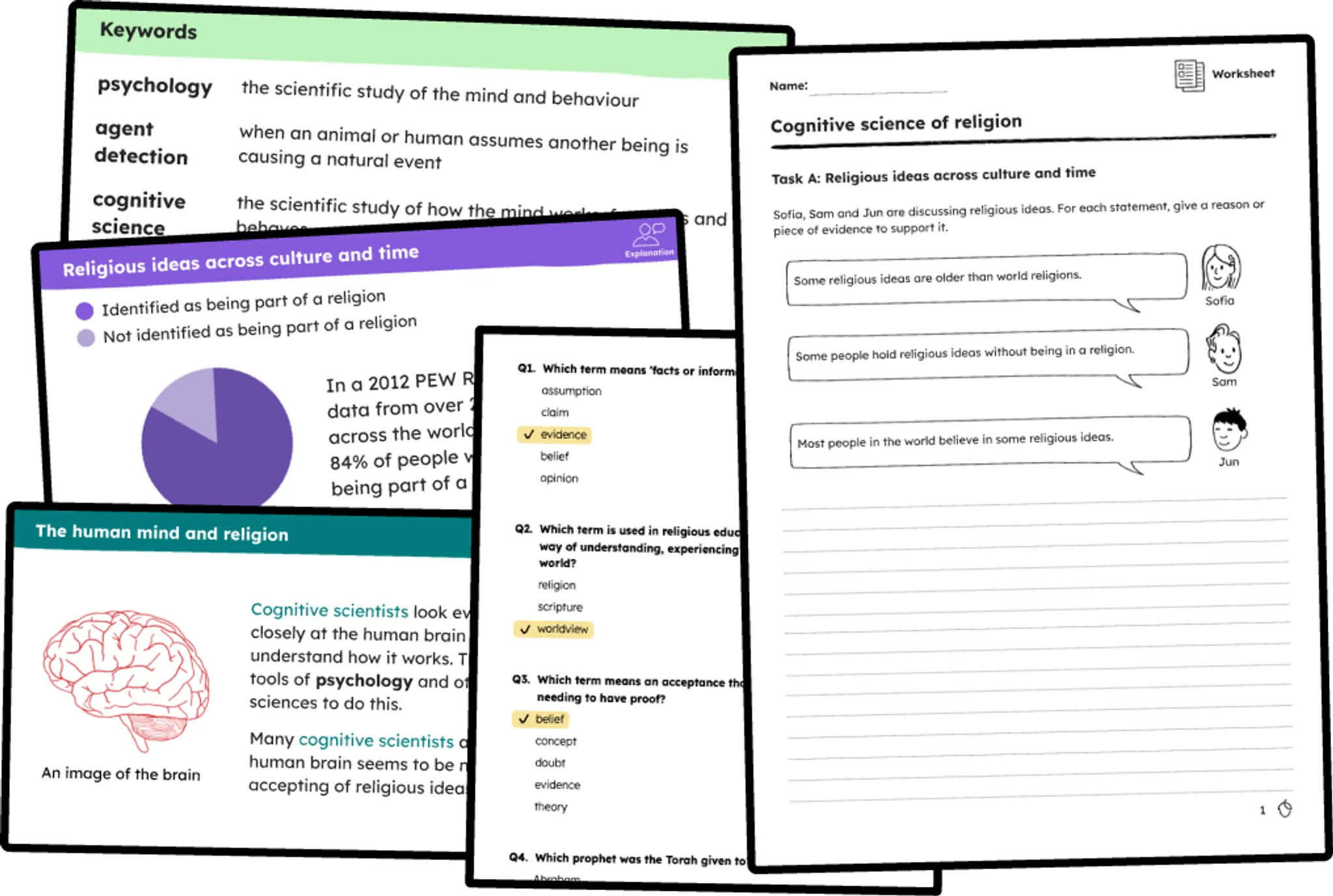
Categories
Curriculum planning
19 November 2025Spark deeper thinking and bring diverse worldviews to life through RE

Adam Robertson
RE Subject Lead
A high quality religious education enables pupils to explore how worldviews shape people’s lives, helping them understand the diverse world around them. Oak’s new free and adaptable RE curriculum and lesson resources are designed to do just that – to bring religion and worldviews to life in classrooms across the country.
Developed with RE experts, these resources have been carefully crafted for both primary and secondary schools. Pennine Learning led the development of the primary resources, while Ormiston Academies Trust – supporting over 35,000 pupils across 44 schools – created the secondary materials.
Together, they’ve created a rich, flexible curriculum that helps you save time on planning while ensuring your teaching captures the latest thinking in Religious Education.
Explore the new curriculum:
- Key stages 1-2
- Key stage 3
- Key stage 3 and GCSE AQA
- Key stage 3 and GCSE Edexcel B
- Key stage 3 and GCSE Eduqas
Free, flexible and aligned to national benchmarks
The curriculum is built out from the Religious Education Council’s national content standard, developed by the RE community. This gives you confidence that your lessons and teaching captures the latest thinking and current approaches to RE – without adding hours of extra research to your week.
All Oak RE lessons are completely free and easy to adapt, so you can quickly tailor them to the requirements of your local syllabus or insert your own case studies – saving time and keeping lessons relevant.
Reflects real-world beliefs
In our curriculum, pupils engage with authentic, diverse examples of belief and practice. We do this through case studies. They see how religion and non-religious worldviews are living, dynamic traditions that continue to evolve in modern Britain. For example, in this year 1 unit on belonging, pupils can watch a video interview with Wayne and Wendy introducing their faith family!
We use case studies to show beliefs are translated into action. For example, in this year 4 unit pupils explore how Go Dharmic and Hindu Climate Action work for environmental change. In this year 5 unit pupils investigate Humanism through a case study of a humanist organisation working to clean beaches in the Philippines.
Stories in the units connect classroom learning with the real world, helping pupils see how worldviews are central to everyday life and are living and breathing rather than static traditions.
Developing critical and enquiry skills
The curriculum goes beyond what to know, to explore how to know. Pupils investigate using tools such as data, interviews, photographs and stories to explore how beliefs change and adapt – learning to ask questions, analyse and interpret.
This approach builds critical thinking and enquiry skills, encouraging pupils to understand how knowledge about religion and belief is developed and debated.
Enquiry at the heart of primary RE
Primary units are built around enquiry questions framed by the disciplines of theology, philosophy and social science. These questions give each unit a clear focus so pupils can follow an enquiry in depth and gain a deeper understanding.
In year 1 pupils ask 'Why is Jesus so important to Christians? They answer this through examining both the Biblical story and looking at Christmas celebrations in the UK and Nigeria.
Progression is built into our sequence. In this year 3 unit pupils investigate who celebrates Christmas and in what ways – exploring whether different people see it as a religious, cultural or secular festival. In year 5 pupils examine stories about Jesus. They use a theological lens to explore what the society of the time was like, and how these stories were interpreted then and by different Christians today.
Each lesson provides opportunities for pupils to see diversity within and between traditions, and to reflect on the meaning and expression of belief in people’s lives. And as everything is designed by subject experts, it gives every primary teacher the confidence to teach RE, no matter what your level of expertise.
Broad, thought-provoking secondary curriculum
At secondary level, Oak’s RE curriculum challenges students to think deeply and critically. Units are structured around big enquiry questions, helping students explore belief through theology, philosophy and social science.
Pupils engage with ethical theories like utilitarianism, consider philosophical debates and connect religion with contemporary issues such as environment and climate change. These lessons help students make sense of global challenges and moral questions, preparing them to think independently and engage thoughtfully with the world around them.
At key stage 4, the curriculum is aligned to different options - choose the curriculum from AQA, Edexcel B and Eduqas exam boards.

Slides and worksheets from the year 8 lesson Cognitive science of religion in the unit Psychology: is our brain designed to believe?
Aligned with Curriculum and Assessment Review priorities
The Curriculum and Assessment Review recommendation that RE is to be made part of the national curriculum is warmly welcomed by Oak. We believe that it will give RE the status it deserves and every student an entitlement to a high quality curriculum. Our RE resources already build on the amazing work in the RE community to focus on worldviews and to equip pupils to understand ways of knowing. Oak will be working with expert partners to update our resources and provide guidance for what’s changing so you can stay ahead of the changes and plan with confidence. Sign up to get the latest updates.
Personalise your lessons with Aila
If you want to personalise your lessons, our AI lesson assistant Aila can help. In an intuitive, step-by-step process, you can co-create lessons that start with your learning outcome and adapt for your pupils as you go. Personalise for reading age, add context for your classroom, and download fully editable lesson plans, slide decks, quizzes and worksheets - all in just minutes.
Accessible, authentic and meaningful
Oak’s RE lessons are designed to be accessible to specialist and non-specialist teachers alike. They uphold RE as a meaningful, academically rigorous subject while reducing the planning burden for busy teachers.
With a range of rich stories and challenging questions, case studies of diverse voices and clear enquiry-driven structures, Oak’s RE curriculum offers a fresh, inclusive approach that supports pupils to build rich knowledge, curiosity and understanding.

